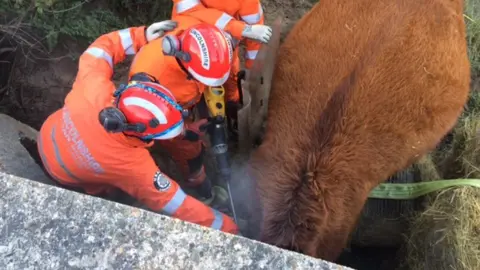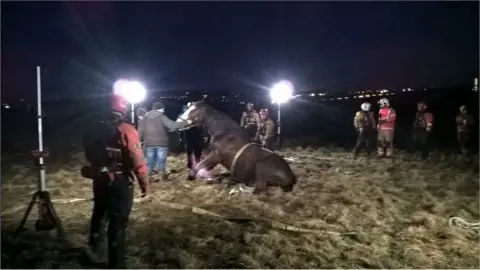Fire services 'spending millions' on animal rescues
 Lincolnshire Fire and Rescue
Lincolnshire Fire and RescueA dog stuck in a wine rack and a snake tangled in an electric fire are some of the 15,293 animal rescues fire services have attended in the last three years.
The cost of these reached at least £6m between 2014 and 2016, with an average cost of £400 per rescue, Freedom of Information requests show.
Firefighters say without their help, people can attempt dangerous rescues themselves.
But the Taxpayers' Alliance said it was not an efficient use of public money.
Among the more unusual rescues the service was called to a puppy stuck in the mechanism of a recliner sofa chair, a cat trapped in a charity clothes bank and a horse that disappeared down a mineshaft.
Last year Lincolnshire Fire and Rescue extracted an 8ft boa constrictor called Billy from a gas fireplace, while in Darlington two pet rats were rescued from a drainage pipe and a cat was removed from the extractor fan of a pizza shop.
 Manchester Fire and Rescue
Manchester Fire and Rescue In rural counties farm animal rescues were not uncommon.
In the last three years Greater Manchester Fire and Rescue said it had attended to many large animals stuck in mud, ditches or rivers.
In Tyne and Wear a horse was rescued after becoming trapped in the metal framework of a quad bike trailer.
But for many fire services, cats still top the list of the species needing rescuing most frequently, often because they get stuck in trees.
All UK fire services responded to The Jeremy Vine Show's request for information on animal rescues. Of these, 17 provided estimated costs.
They are estimated to have cost £2m a year across the UK between 2014 and 2016.
 Gainsborough Fire Station
Gainsborough Fire StationJohn O'Connell, chief executive of the campaign group the Taxpayers' Alliance, said: "Something is clearly awry if they can spend so much of their time and taxpayers' money rescuing these animals from such 'peril'.
"Budgets are tight in all areas of the public sector and in future they need to make sure they are using their resources to maximum efficiency."
A spokesperson from Lancashire Fire and Rescue said: "Our firefighters are paid a salary and putting a financial cost on an incident turn-out is misleading.
"No animal rescue would take those resources away from the rescue of a person, or to save a house from burning down."
A statement from the Kent service said: "If we didn't attend we know from past experience that members of the public could be injured or put themselves into dangerous situations (and subsequently need rescuing) while attempting to rescue the animal themselves."
